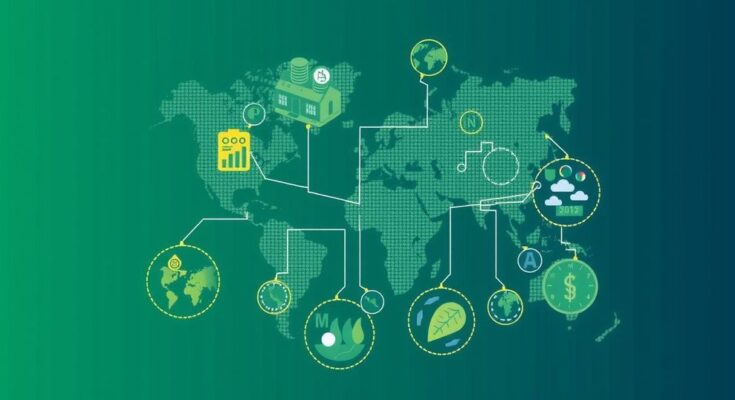JBS, the world’s largest meatpacker, is seeking public funding for climate change solutions, highlighting the low investment in agriculture. CEO Gilberto Tomazoni calls for $300-350 billion for transformation while facing criticism regarding livestock’s significant emissions in Brazil. Amidst international pressure and sustainability discussions, the company aims to assert agriculture’s role in combatting global warming, despite opposition advocating for reductions in meat consumption and a focus on sustainable practices.
JBS, the world’s foremost meat producer, with impressive net revenues of $3.1 billion in the second quarter of 2024, is advocating for more public investment to address climate change. Gilberto Tomazoni, the company’s global CEO, criticized the current allocation of only four percent of climate finance to agriculture and food systems, while asserting that agriculture possesses significant potential for carbon capture. He estimates that transforming the sector would require between $300 billion and $350 billion. Despite Tomazoni’s portrayal of the meat industry as an underappreciated ally in combating climate change, Brazilian scientists highlight the sector’s considerable contribution to greenhouse gas emissions, with livestock accounting for 28 percent of Brazil’s total emissions. This is largely attributed to methane emitted by cattle and deforestation driven by ranching. Tomazoni’s appeal for increased investment is aligned with broader efforts by agricultural corporations to position themselves as integral to global warming mitigation strategies during international summits, including the forthcoming G20 meeting in Rio de Janeiro. The agribusiness sector is poised to benefit from a recent pledge by the IMF and the World Bank to double support for “climate-smart” agriculture to $9 billion annually by 2030. However, critics assert that the industry often avoids discussing the need for reduced meat consumption, instead promoting misleading claims about livestock’s role in sustainable food systems. Furthermore, while advocates argue that livestock can enhance soil health for carbon storage, scientists warn that soil is not a dependable long-term carbon storage solution. Moreover, the food industry’s claim that it can address hunger and malnutrition is challenged by the United Nations Committee on World Food Security, which recognizes that food insecurity arises chiefly from issues related to power, access, and distribution. Tomazoni played a vital role in the B20 Food Systems and Sustainable Agriculture Task Force, which strives to influence G20 agricultural policies alongside allies such as US soy trader Bunge and China’s Cofco. The G20 Agriculture Working Group demonstrated receptiveness to the B20’s recommendations, incorporating a significant portion into their joint statement. The B20 group emphasized the need for an equitable multilateral trading system, raising concerns over protectionist measures that may arise from regulations such as the EU’s upcoming Deforestation-Free Products Regulation. Critics have lambasted the demand for public investment from agribusiness, deeming it absurd given the sector’s significant growth and environmental impact over recent years. Carlos Bocuhy of the Brazilian Institute for Environmental Protection argues that investments should focus on agroecology and small-scale farmers instead, as these approaches promote sustainability. In light of a November report showing Brazilian agriculture has set new records for greenhouse gas emissions, the discussion surrounding livestock management and its impact on climate change is increasingly urgent. Experts identify potential solutions such as limiting cattle herd sizes or advancing early slaughter as viable methods to mitigate emission levels, though such measures face resistance from agricultural interests due to their potential impact on exports. Livestock production not only remains the largest emitter but is also responsible for a staggering 77 percent of deforestation in the Amazon from 1985 to 2022.
This article addresses the ongoing debate surrounding the agricultural sector’s role in climate change and sustainable food production, particularly focusing on JBS, the world’s largest meatpacker. With a significant carbon footprint from livestock emissions and deforestation, the company is now seeking public funding to enhance climate resilience within the sector. The discussion touches on the broader implications of these requests in the context of global agricultural policies, scientific critique, and the nature of climate financing targeted at agribusinesses amidst rising greenhouse gas levels.
In conclusion, JBS’s push for public funding to combat climate change encapsulates a broader narrative within the agricultural industry that attempts to reposition itself as part of the solution to climate issues. However, significant scientific and social critiques persist, emphasizing the need for structural changes that address consumption patterns and prioritize sustainable practices. As greenhouse gas emissions continue to rise, particularly from livestock, the urgency for genuine environmental responsibility within the agribusiness sector grows ever more critical.
Original Source: www.desmog.com




